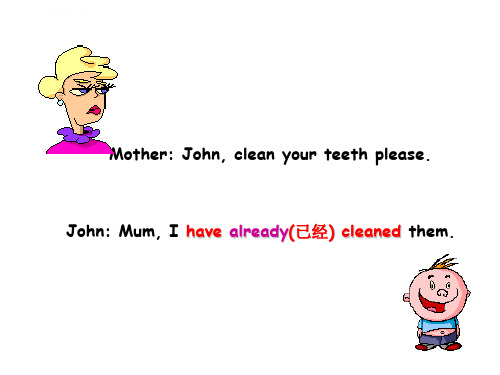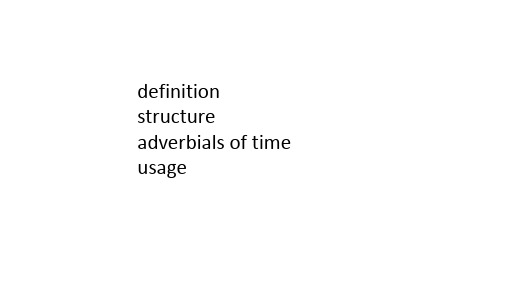初中英语现在完成时课件优秀课件
合集下载
初中时态讲解《现在完成时》(共28张PPT)

•
—I have _____ to Kunming with my
friends.
• A been , gone
B been , been
• C gone , been
D gone, gone
• ( C )2. How long have you ____ this book?
• A. bought B. borrowed C. had D. lent
Yes,she has.?No,she hasn’t.
4.时间状语:already, yet, ever, never, just, before , for, since, so far, till/until, up to now, in the past/last few years, recently, … 等.
5.现在完成时的概念
1)表示过去发生或已完成的动作对 现在造成的影响或结果;
2) 表示过去已经开始并一直持续 到现在的动作或状态。
• 意义1
• 表示过去发生或已完成的动作对现在造成的影响 或结果
My daughter hasjust gonoeut. 我女儿刚出去。 (go)
I’m sure we have metbefore. 我肯定我们以前见 过面。(meet)
3.They have left only for 5 minutes. 错 They have __b_ee_n_ __a_w_a_y only for 5 minutes.
• 1) They came here last week.
• They ____h_a_v_e__ _b_e_e_n_____ here since ______la_s_t_ w__e_e_k______.
现在完成时ppt精品课件ppt课件

❖ 8.What time have the factory opened?
did
open
❖ 9.I have gone to Chunhua Middle School twice been to
Exercises
❖ I am an American boy I came to China two years ago. Ihave s_tu_d_ie_d_(study) here for two years. My father often takes(take) me_to__pl_ay_ (play) football on the playground.
Exercises
❖ 1. I h__a_v_e_h_a_d_(have) lunch already. ❖ 2. Has the train_a_r_r_iv_e_d_ (arrive), yet? ❖ 3.Tome _h_a_s_ never_b_e_e_n__to_ (be to ) China. ❖ 4. The twin __h_a_s__just _s_e_e_n_(see) my
❖ have/has been in:表示某人“已在某地停留 一段时间,现仍在那里”,其后常带表示 一段时间的状语。
Exercises
❖ Tom 在哪儿? 他去书店买书了。 -Where is Tom?
-He has gone to the bookshop to buy some books. ❖ 我在北京待了5年了。
eg.1. He had his breakfast at 6:00 He has had his breakfast.
2. When did you come here? I watched the football match on TV at 9:00.
初中英语现在完成时态讲解精品ppt课件

• 你已经找到你的书了吗? (find-found) Have you found your book yet?
• 他们在这个城市建了许多房子. (build-built) They have built many buildings in this city.
• Judy还没到达. (arrive-arrived) Judy hasn’t arrived yet.
comb your hair ------ have combed it wash your hands ----- have washed them study for English test ----- have studied for it tell me the truth -----have told you everything visit your grandpa ----- have visited him listen to the English tape ----- have listened to it
Invention newspaper canned food
Date 1610 1823
sewing machine(缝纫机) airplane plastic(塑料)
1851 1903 1907
People have read newspaper since 1610 . People have read newspaper for about 400 years.
采用PP管及配件:根据给水设计图配置好PP管及配件,用管件在 管材垂 直角切 断管材 ,边剪 边旋转 ,以保 证切口 面的圆 度,保 持熔接 部位干 净无污 物
Father: Tell your sister to buy some milk, John.
• 他们在这个城市建了许多房子. (build-built) They have built many buildings in this city.
• Judy还没到达. (arrive-arrived) Judy hasn’t arrived yet.
comb your hair ------ have combed it wash your hands ----- have washed them study for English test ----- have studied for it tell me the truth -----have told you everything visit your grandpa ----- have visited him listen to the English tape ----- have listened to it
Invention newspaper canned food
Date 1610 1823
sewing machine(缝纫机) airplane plastic(塑料)
1851 1903 1907
People have read newspaper since 1610 . People have read newspaper for about 400 years.
采用PP管及配件:根据给水设计图配置好PP管及配件,用管件在 管材垂 直角切 断管材 ,边剪 边旋转 ,以保 证切口 面的圆 度,保 持熔接 部位干 净无污 物
Father: Tell your sister to buy some milk, John.
初中英语现在完成时全英文讲解课件(12张PPT)

I have just cleaned my hands. I have lost my wallet. I have already finished my homework. I am free.
初中英语现在完成时全英文讲解课件 (12张P PT)
difference between the past simple tense and present
adverbials of time
since,ever,so far,up to now,just, already, for a few years 自从曾经到现在,刚刚已经有几年 yet(否定句),never,before,in the past few years...
usage1 “完成用法” 强调过去发生的动作对现在造成的影响或结果,常用状语有:already, yet, never, ever, just, before ...
初中英语现在完成时全英文讲解课件 ( (12张P PT)
常见短暂性动词变延续性动词
leave— been away from
buy—have
borrow—keep
die—be dead
get up—be up
come / get back—be back
初中英语现在完成时全英文讲解课件 (12张P PT)
初中英语现在完成时全英文讲解课件 (12张P PT)
two kinds of verbs
It's died for a couple of days.
×
It's been dead for a couple of days. √
短暂性动词的现在完成时的肯定式不能和表示一段时间的状语 连用。
初中英语现在完成时全英文讲解课件 (12张P PT)
difference between the past simple tense and present
adverbials of time
since,ever,so far,up to now,just, already, for a few years 自从曾经到现在,刚刚已经有几年 yet(否定句),never,before,in the past few years...
usage1 “完成用法” 强调过去发生的动作对现在造成的影响或结果,常用状语有:already, yet, never, ever, just, before ...
初中英语现在完成时全英文讲解课件 ( (12张P PT)
常见短暂性动词变延续性动词
leave— been away from
buy—have
borrow—keep
die—be dead
get up—be up
come / get back—be back
初中英语现在完成时全英文讲解课件 (12张P PT)
初中英语现在完成时全英文讲解课件 (12张P PT)
two kinds of verbs
It's died for a couple of days.
×
It's been dead for a couple of days. √
短暂性动词的现在完成时的肯定式不能和表示一段时间的状语 连用。
初中英语现在完成时课件(共62张PPT)

speak-spoke-spoken
freeze-froze-frozen
ride-rode-ridden
get-got-gotten (got) forget-forgot-forgotten (forgot) 特殊:
am/is-was-been are-were-been,
do (does)-did-done go-went-gone
I have already done my homework. 否定句: I haven’t done my homework yet. 一般疑问句: Have you done your homework yet?
3. ever在现在完成时中的用法
肯定句/疑问句 : 句中 “曾经” I’ve ever been to Beijing. Have you ever been to Beijing?
catch,teach
ABB(含规则动词)
1.另有一些其它形式的变化。
have (has)-had-had lose-lost-lost feel-felt-felt stand-stood-stood
leave-left-left make-made-made spell-spelt-spelt
ABA
有些动词的过去分词与原形是一样的:
run-ran-run come-came-come become-became-become overcome-overcame-overcome
ABB(含规则动词)
原型 过去式 过去分词
例词
-eep -ept -ept
keep,sweep,sleep
-ell -old -old
加-ed 结尾是“辅音字母+y”
现在完成时课件人教版九年级英语全册

般过去时 “自...以来已经多长时间”
A :How long have you had
?
B: I have had ___________ s have had ____________since ___________ago.
D:I have had
for
years.
2) for + _时__间__段____ (时间点/时间段):
指某个动作或情况到现在为止持续了多久
3) since + _时__间__点____ (时间点/时间段):
指某个动作或情况从过去某个时间点
一直持续到现在
for 和 since 有时候可以互换:
for + 时间段
=
since + 时间段+ ago
她买那个玩具熊多久了? --How long has she had that toy bear?
买了六年多了。 —She has had that toy bear for more than 6 years.
1.这本书我已借了两月了。
I have kept the book for a month. 2.这位老人已去世多年了。
finish — be over
fall sleep — be asleep
join — be in/be a member of
become — be
make friends — be friends
come/go/ — be+相应的介词短语
1) Mary __h_a_s_b__e_e_n___( has been/ has
4a 3. I have a camera. I bought it in 2009.
A :How long have you had
?
B: I have had ___________ s have had ____________since ___________ago.
D:I have had
for
years.
2) for + _时__间__段____ (时间点/时间段):
指某个动作或情况到现在为止持续了多久
3) since + _时__间__点____ (时间点/时间段):
指某个动作或情况从过去某个时间点
一直持续到现在
for 和 since 有时候可以互换:
for + 时间段
=
since + 时间段+ ago
她买那个玩具熊多久了? --How long has she had that toy bear?
买了六年多了。 —She has had that toy bear for more than 6 years.
1.这本书我已借了两月了。
I have kept the book for a month. 2.这位老人已去世多年了。
finish — be over
fall sleep — be asleep
join — be in/be a member of
become — be
make friends — be friends
come/go/ — be+相应的介词短语
1) Mary __h_a_s_b__e_e_n___( has been/ has
4a 3. I have a camera. I bought it in 2009.
初中现在完成时讲解ppt

for
since
for
since
for
since
练习题: 1.It's a long time since we ____ (meet) last, isn't it? 2.--I know you ___________ (choose) a picture book among these. --Yes,Have a look at it, please. 3.So far, spaceships without people ___________ (reach) the moon and some other parts of the universe. 4.My father____ home for nearly three weeks. A.has gone away from B.has left C.has been away from D.went away 5.Mr. and Mrs. Green have_____in China for a week. A.been B.got C.arrived D.reached
eg.--- I’ve lived here for 15 years. eg.--- I’ve lived here since 15 years ago(1990)
选用for和since填空: 1.We haven’t seen each other ______ a long time. 2.His father has been in the factory ______ 10 years ago. 3.The film has been on ______ 20 minutes. 4.Mr Green has worked here ______ he came to China. 5.His grandparents have been dead ______ several years. 6. It’s five years _______ we met last time
since
for
since
for
since
练习题: 1.It's a long time since we ____ (meet) last, isn't it? 2.--I know you ___________ (choose) a picture book among these. --Yes,Have a look at it, please. 3.So far, spaceships without people ___________ (reach) the moon and some other parts of the universe. 4.My father____ home for nearly three weeks. A.has gone away from B.has left C.has been away from D.went away 5.Mr. and Mrs. Green have_____in China for a week. A.been B.got C.arrived D.reached
eg.--- I’ve lived here for 15 years. eg.--- I’ve lived here since 15 years ago(1990)
选用for和since填空: 1.We haven’t seen each other ______ a long time. 2.His father has been in the factory ______ 10 years ago. 3.The film has been on ______ 20 minutes. 4.Mr Green has worked here ______ he came to China. 5.His grandparents have been dead ______ several years. 6. It’s five years _______ we met last time
现在完成时ppt精品课件

B: Where did you buy it?
A: I bought it in my hometown. A: have you seen the film? B: Yes, I have. A: When did you see it? B: I saw it last Sunday.
现在完成时不能与表示过去的时间状语连 用,常与之连用的时间状语有:
6. Mr. Brown has had his TV __f_o_r__ 15 years. 7. I’ve taken driving lessons __s_in_c_e__last month.
8. My sister has had her cell phone _f_o_r___a month .
He studied English for five years.
(只说明他过去学过五年英语,但现在不学了。)
❖ I’ve lived here for ten years. 我在这里住了 10年。(现在仍住这儿)
❖ I lived here for ten years. 我在这里住过10 年。(现在不住这儿了)
再加“ ed ”。 , study---studied---studied
cry---cried---cried
(4)、重读闭音节结尾,末尾只有一个辅音字母, 先双写该辅音字母,再加“ ed ”。
stop---stopped---stopped drop---dropped--dropped
2、不规则变化
当有 so far, in/during/over the past/ last few days(在过去/最近的几年里),since 接过去时间状语或过去时的句子等常用 现在完成时 (不能与确定的时间)
- 1、下载文档前请自行甄别文档内容的完整性,平台不提供额外的编辑、内容补充、找答案等附加服务。
- 2、"仅部分预览"的文档,不可在线预览部分如存在完整性等问题,可反馈申请退款(可完整预览的文档不适用该条件!)。
- 3、如文档侵犯您的权益,请联系客服反馈,我们会尽快为您处理(人工客服工作时间:9:00-18:30)。
already常用于肯定句中或句末; yet常用于一般疑问句或否定句末。
e.g. 1.Tom has already finished his work. 2.Tom hasn’t finished his work yet.
2) 表示过去某个动作(延续性动词), 持续到现在, 甚至还会继续下去 的动作或状态,常与包括现在在 内的一段时间的状语连用。
初中英语现在完成时课件优秀 课件
一、谓语动词的构成: have/ has +动词过去分词
过去分词的构成
1.直接加-ed。如:play-played
2.以辅音字母加y结尾的,变y为i加ed。 如:carry-carried
3.以字母e结尾的直接加d 。如:name-named 4.重读闭音节且末尾只有一个辅音字母, 双写这个辅音字母再加-ed。如:stopstopped 5.不规则变化。如:eat- eaten, see-seen
在造成的影响或结果。
Have you had your breakfast yet? I have read the book twice already.
常和already, yet, never, just, before, ever, recently等标志性副词连用。
already和yet的区别
you have studied English for 6 years.
Tom has lived in Beijing since 2008.
for+一段时间 since+过去时间点 Since+一段时间+ago Since+从句(从句用一般过去时)
谓语只可用延续性动词. I’ve lived here for 8 years. I’ve lived here since 2008. I’ve lived here since 8 years ago. I’ve lived here since I was born.
现在完成时 句型
肯定句
肯定句式是“have(has)+过去分词 注意:该句式中的have或has是助动词,has用于第三
人称单数,其它人称一律用have。
I have(缩写为I’ve) eaten my lunch. She has(不缩写) eaten her lunch.
否定句
现在完成时的否定形式: have not (haven’t) +过去分词 has not (hasn’t) +过去分词
I have not (haven’t) seen the film. She has not (hasn’t) seen the film.
疑问句
一般疑问句式是把助动词have或has提到主语之 前。 (回答用“Yes,...have (has)./“No,...haven’t (hasn’t).” )
I have seen the film twice. I saw the film last week.
He has lived here since 1993.
He lived here in 1993.
四、现在完成时练习
1, 写出下列动词的过去式和过去分词
1.play played played
Have you known Sandy for a long time? Yes, I have./ No, I haven’t.
Has she eaten breakfast yet? Yes, she has./ No, she hasn’t.
二、现在完成时表示的意义及标志性词 1、表示过去发生的或已经完成的动作, 但对现
他爷爷已经去世五年了。 His grandpa has been dead for five yhave been to的区别:
have gone to:“去了某地”,表示某人在路上,
或者在目的地;已不在原地。
have been to:“曾去过某地” , 说话时人已不在某地了,已经回来。
He has been to Xi’an twice.
他曾经去过西安两次。(已经回来了)
You can’t find him. He has gone to Xi’an.
你找不到他。他去西安了。(还没回来)
3、现在完成时与一般过去时的区别
现在完成时属于现在时态的范围,不能和表示过 去的时间状语连用,如yesterday,last night,three weeks ago,in1990等.而一般过去时只表示过去的动 作或状态,和现在没有关系。
2. carry carried carried
3. name named named 4. stop stopped stopped 5. go went gone
2、用already和yet的填空
1.Tom has already finished his work.
2.Tom hasn’t finished his work yet .
三、现在完成时的基本用法
1.短暂性动词和延续性动词(前面为短暂性动词)
leave= be away from begin= be on
die =be dead
borrow= keep
buy=have
marry =be married
这本书露西已经借了一个月了。
Lucy has kept the book for a month.
3. Have you finished it yet
?
3,用for和since填空。
__fo_r____a week __fo_r____a long time __si_n_ce___1997
__fo_r___two weeks __s_in_c_e__three years ago _si_n_ce____ last month
e.g. 1.Tom has already finished his work. 2.Tom hasn’t finished his work yet.
2) 表示过去某个动作(延续性动词), 持续到现在, 甚至还会继续下去 的动作或状态,常与包括现在在 内的一段时间的状语连用。
初中英语现在完成时课件优秀 课件
一、谓语动词的构成: have/ has +动词过去分词
过去分词的构成
1.直接加-ed。如:play-played
2.以辅音字母加y结尾的,变y为i加ed。 如:carry-carried
3.以字母e结尾的直接加d 。如:name-named 4.重读闭音节且末尾只有一个辅音字母, 双写这个辅音字母再加-ed。如:stopstopped 5.不规则变化。如:eat- eaten, see-seen
在造成的影响或结果。
Have you had your breakfast yet? I have read the book twice already.
常和already, yet, never, just, before, ever, recently等标志性副词连用。
already和yet的区别
you have studied English for 6 years.
Tom has lived in Beijing since 2008.
for+一段时间 since+过去时间点 Since+一段时间+ago Since+从句(从句用一般过去时)
谓语只可用延续性动词. I’ve lived here for 8 years. I’ve lived here since 2008. I’ve lived here since 8 years ago. I’ve lived here since I was born.
现在完成时 句型
肯定句
肯定句式是“have(has)+过去分词 注意:该句式中的have或has是助动词,has用于第三
人称单数,其它人称一律用have。
I have(缩写为I’ve) eaten my lunch. She has(不缩写) eaten her lunch.
否定句
现在完成时的否定形式: have not (haven’t) +过去分词 has not (hasn’t) +过去分词
I have not (haven’t) seen the film. She has not (hasn’t) seen the film.
疑问句
一般疑问句式是把助动词have或has提到主语之 前。 (回答用“Yes,...have (has)./“No,...haven’t (hasn’t).” )
I have seen the film twice. I saw the film last week.
He has lived here since 1993.
He lived here in 1993.
四、现在完成时练习
1, 写出下列动词的过去式和过去分词
1.play played played
Have you known Sandy for a long time? Yes, I have./ No, I haven’t.
Has she eaten breakfast yet? Yes, she has./ No, she hasn’t.
二、现在完成时表示的意义及标志性词 1、表示过去发生的或已经完成的动作, 但对现
他爷爷已经去世五年了。 His grandpa has been dead for five yhave been to的区别:
have gone to:“去了某地”,表示某人在路上,
或者在目的地;已不在原地。
have been to:“曾去过某地” , 说话时人已不在某地了,已经回来。
He has been to Xi’an twice.
他曾经去过西安两次。(已经回来了)
You can’t find him. He has gone to Xi’an.
你找不到他。他去西安了。(还没回来)
3、现在完成时与一般过去时的区别
现在完成时属于现在时态的范围,不能和表示过 去的时间状语连用,如yesterday,last night,three weeks ago,in1990等.而一般过去时只表示过去的动 作或状态,和现在没有关系。
2. carry carried carried
3. name named named 4. stop stopped stopped 5. go went gone
2、用already和yet的填空
1.Tom has already finished his work.
2.Tom hasn’t finished his work yet .
三、现在完成时的基本用法
1.短暂性动词和延续性动词(前面为短暂性动词)
leave= be away from begin= be on
die =be dead
borrow= keep
buy=have
marry =be married
这本书露西已经借了一个月了。
Lucy has kept the book for a month.
3. Have you finished it yet
?
3,用for和since填空。
__fo_r____a week __fo_r____a long time __si_n_ce___1997
__fo_r___two weeks __s_in_c_e__three years ago _si_n_ce____ last month
